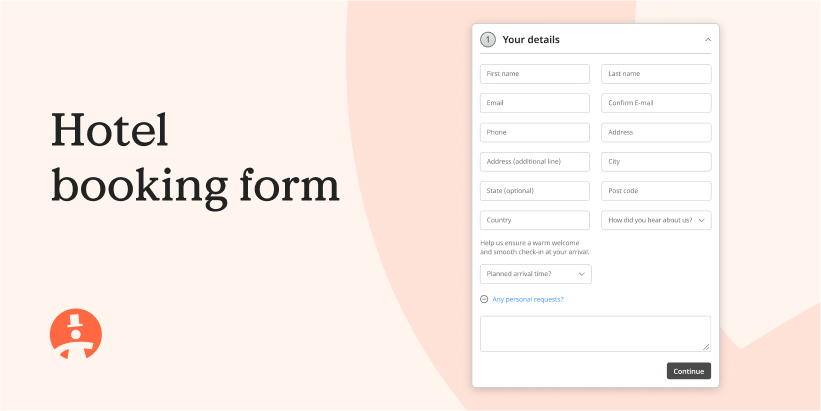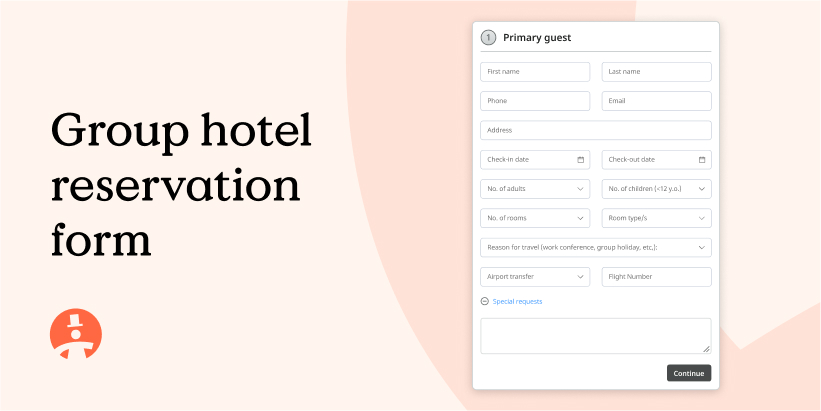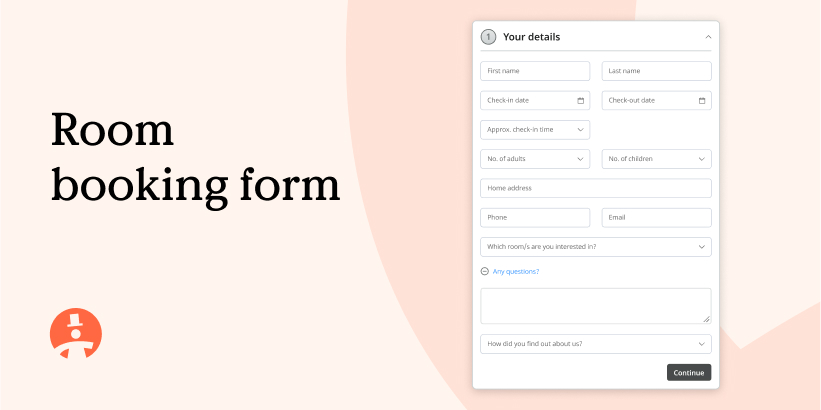What is a hotel reservation form?
A hotel reservation form is a document used to obtain all the information that a hotel needs when taking a reservation from a guest. It enables hotels to get to know their guests better and create a personalised experience for them.
Completing a hotel reservation form is a key step in the booking process, whether the reservation is taken through a travel agent, a hotel booking website, or by the hotel itself.
However, it shouldn’t be too exhaustive to be a burden on the guest. A good hotel reservation form needs to be as easy to fill out – i.e. short – as reasonably possible.
Why are hotel reservation forms important?
For small, independent hoteliers, creating your own hotel booking form can be a critical piece in reducing reliance on third-party bookings. By cutting out the OTA (online travel agent) middleman, direct bookings earn you more money and allow you to offer better rates. Nevertheless, guests will often still go to a more expensive OTA because they perceive the booking process to be simpler.
But by creating your own form that is easy to fill out for the guest, and obtains information that can help you make their stay that much more special, you can secure more direct bookings and increase revenue.
What information should be included in a hotel reservation form?
If you have previously relied on OTAs (online travel agencies like Booking.com, Expedia, Airbnb) to take bookings, or have used a ‘standard’ form that you found on the internet, you may be wondering what information you should seek to collect.
The information you ask your guests to provide will depend on what you hope to do with it. For some hotels, a name, phone number, dates and payment details will suffice. For others, particularly those that focus on guest engagement, more information will help with marketing and loyalty efforts. Information can either be required or optional, and may include:
- Guest name
- Contact information (phone and/or email)
- Check in and check out dates (with times)
- Number of guests
- Room type and other preferences
- Payment details and confirmation
- Other applicable information (guest address, flight info, transportation, bookable extras, any other notes/special requests)
Hotel reservation form samples
Looking for hotel reservation form samples and inspiration? Here are three hotel reservation form examples that might deliver just that.
Hotel booking form
This sample hotel booking form is used by an award-winning countryside hotel in the UK to capture guest information and get direct bookings. It contains basic details such as name, contact info, and address, but it is also customised to meet their specific business needs such as having space for any personal requests, planned arrival time, and how the guest heard about their hotel.

Group hotel reservation form
A group hotel reservation form is used by hotels to work more efficiently with large groups. These might be business travellers in town for a conference, extended families who are holidaying together, or tour groups (in which case the hotel will work with the tour company, rather than directly with the guests). A group reservation form may look a little like this:

Room booking form
This room booking form is an example that can be used by small, independent hoteliers to get started with taking reservations more effectively. Designed to make it easier for potential guests to specify the type of room they’re interested in, this form can help clarify other questions or concerns they might have as well.

How online booking forms make hotel reservations easier
By employing a reservation form that is easy to work with for both you and your guests, and that you can review and edit whenever and wherever you need, the process of taking reservations can be made so much simpler. Here’s five different ways how.
Online hotel reservation forms automate a manual process
Online booking forms can automate the otherwise manual process of taking a booking over the phone or via email. If you employ a form as part of a complete online booking system, your guest can essentially key in a reservation themselves, as the process can be almost entirely automated. You save both time and money.
Online hotel reservation forms can be filled out 24/7
Not many small, independent hoteliers can afford to employ someone to take bookings 24/7 – but that’s exactly what a well crafted hotel reservation form will do, letting guests work to their own schedule.
Online hotel reservation forms help personalise the guest experience
A custom hotel booking form lets you ask your guests for all manner of info. While you can’t ask them to write too much about themselves, the more details you get from the guest, the better you will be able to personalise their experience, which can increase the likelihood that they become return visitors.
Online hotel reservation forms reduce reliance on OTAs
Direct bookings are without doubt the best bookings. OTAs like Booking.com and Expedia charge 15-25% commission on any reservation they secure for you. By using a reservation form to facilitate direct bookings, you can either choose to keep that extra cash or make your rates far more competitive in order to secure more business.
Online hotel reservation forms minimise mistakes and increase transparency
Taking a reservation over the phone or via email is fraught with risk – information is often incorrect, incomplete, or a mixture of both. A carefully crafted reservation form puts the responsibility in the guest’s hands, while guiding them through the information they need to supply. Required fields and predefined drop-down menus help to maximise clarity and accuracy.
By Dean Elphick
Dean is the Senior Content Marketing Specialist of Little Hotelier, the all-in-one software solution purpose-built to make the lives of small accommodation providers easier. Dean has made writing and creating content his passion for the entirety of his professional life, which includes more than six years at Little Hotelier. Through content, Dean aims to provide education, inspiration, assistance, and, ultimately, value for small accommodation businesses looking to improve the way they run their operations (and live their life).
Table of contents
“It's been a huge time-saver for me. It's convenient to swipe through all the rooms and make a new booking. I'm having a fantastic time with it.”
Operational Manager, Samui Bayside








